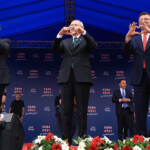Turkey’s elections, regarded widely as “existential,” are over, and their consequences are being scrutinized by analysts the world over. What is the significance of another Erdoğan victory beyond Turkey’s borders? What signal does Erdoğan’s new cabinet send to the world? Can we expect a softening or a consolidation of autocratic order?
Steven Cook answers some key questions with FTP Editor-in-Chief Yavuz Baydar. Cook is Eni Enrico Mattei senior fellow for Middle East and Africa studies and director of International Affairs at the Council on Foreign Relations (CFR). He is an expert on Arab and Turkish politics as well as U.S.-Middle East policy. Cook is the author of False Dawn: Protest, Democracy, and Violence in the New Middle East; and Ruling but Not Governing: The Military and Political Development in Egypt, Algeria, and Turkey.
FTP: You were a keen monitor and observer of the elections. How do you define these results?
SC: Globally speaking, one big question is how to we define Turkey as a result? Does competitive authoritarianism, or illiberal democracy, or elected autocracy – do these labels mean anything anymore?
I wonder if the qualifiers are still important. “Competitive authoritarianism,” for example, is a relative term, to signify that elections mean more in Turkey than in, say, Egypt. But is that really meaningful? Especially knowing what we know now about the means that Erdoğan used to ensure the outcome he wanted. What’s different about Turkey, as opposed to Egypt for example, is that in Turkey people infuse their vote with meaning, and therefore you get these huge turnouts. But I wonder if after this election, whether people are still going to do that. At what point can we move Turkey from the “illiberal democracy” category to just plain old authoritarianism?
Of course, the AKP will want to cement their power constitutionally, and of course there will still be elections—all authoritarians have elections—but whether people will still infuse those votes with meaning will be something to watch.
Globally speaking, this was a blow to democracy. Even though leaders like Biden were relatively quick to congratulate President Erdoğan. I wonder if there were no conflict in Ukraine, how quickly those leaders would have congratulated him, but nevertheless it happened. And it’s a blow to democracy, for Erdoğan to have won the way he did, where there remain lots of questions about the conduct of the elections.
FTP: Has Turkey passed the threshold into a rougher form of authoritarianism? Is this a step toward consolidating a Turkish-style fascism?
SC: I think that’s right, and that’s my concern: that this election is the moment that we move from competitive authoritarianism to something that looks more like an authoritarian system.
That’s a more likely outcome than any shift towards democratic politics. For the longest time, Erdoğan has governed half the country [his supporters] and intimidated the other half, and if he wants to consolidate the changes he’s made, he is going to need authoritarian institutions. And that’s clearly what’s happening with the new constitution.
And with those authoritarian institutions is the coercion of the Turkish State. There were many wild speculations about his election, but I don’t think it’s too wild to speculate about the deepening of authoritarianism in Turkey as a result.
After all, Erdoğan comes from a tradition that sees the Republic in hostile ways. I think that’s one reason it was so important to him to be reelected, so that he is the President on the Republic’s hundredth anniversary, when he can declare himself more important than Ataturk, and it will legitimize the trajectory that he and the AKP have put Turkey on.
FTP: The new cabinet has been announced. What is your assessment of the composition, the choice of personalities, the changes of ministers? What signals is Erdoğan sending to the West?
SC: There’s been a lot of time spent thinking about this, but I’m not sure that the answer is very complicated. Erdoğan has never given his ministers autonomy, and I don’t know why anything should change. What we see in the return of Mehmet Simsek, for example…I’m not convinced it will mean more orthodox economic policies. There are elections coming up, and clearly Erdoğan wants to win back Istanbul and Ankara.
So I’m not convinced that Simsek will have the freedom to do the things he wants to do.
People also say, for example, that Hakan Fidan [the new foreign minister] will bring professionalism and moderation…but he was Erdoğan’s way into Iran and the IRGC, his connection to extremist groups in Northern Syria. You may want to say that this is what spymasters are supposed to do, but there is nothing in his record to suggest that he is a professional diplomat, or that others trust him. He presided over the disappearances of Turkish nationalists around the globe. So I think “moderate” is a misnomer.
{I don’t know why] these people are being portrayed as moderate or a turn to the West. And in any case these personalities seem to be more window dressing than anything else.
FTP: Yet Jake Sullivan [U.S. National Security Adviser] recently described Turkey as a democracy. What does this tell us?
SC: I disagree with Jake Sullivan’s assessment. And given what he wrote before he was National Security Adviser, I don’t think he really believes Turkey is a democracy. But I think he is looking at the world as it is right now, with a major land war in Europe. American policy makers want to make sure they keep Turkey on side to the extent that it is. I don’t think anyone really believes that Turkey is a democracy. I think they would prefer to have Turkey within the NATO tent and cooperating as much as possible.
I do think the U.S. should play hardball on Sweden’s entrance into NATO. The war isn’t going so well for Russia; Russia is not likely to threaten Sweden, and so I think getting Sweden into NATO is less of an emergency as it was in the winter and spring of 2022. And so I think there’s some breathing space for the U.S. and I think we need to hold out for something more from Erdoğan before we part with F-16’s.
FTP: Speaking of foreign policy, which now seems linked to the economy—do you expect any changes at all? And what about the conflict spots in Syria, Greece, etc.?
SC: There is a theory that suggests that Turkey’s economic needs are so great that Erdoğan will be forced to make amends with the United States and the Europeans, be more cooperative on Sweden, etc., because Turkey’s economic salvation will be through Western capitals. I’m somewhat skeptical that there will be an IMF agreement, and that Erdoğan can make those amends so quickly.
It goes two ways. A crippled Turkish economy creates major challenges for the EU.
But if nothing else Erdoğan is a good politician, and he will be looking forward to local elections. And the kinds of things the IMF or Western capitals will want him to do are going to hurt his constituencies. Why not continue to muddle through on Gulf money, blaming others and hammering away on identity issues?
Some say economics were absent from this election. I think it’s hard to disentangle. When people go to the ballot box the question is are you better off now—but what’s in your wallet is only part of the answer to that. Are your values being protected? Do you feel the government reflects who you are?
So I’m not as convinced that the Turkish economic situation is going to drive its foreign policy into a more “West-friendly” place. I certainly think it’s going to have some effect on foreign policy, but I don’t think it’s a foregone conclusion that Turkey will suddenly turn towards Brussels, Washington, NATO.
FTP: In his latest piece for FTP, Henri Barkey argued that now is the time, as Simsek visits Western capitals, to remind him of the absence of rule of law in Turkey. But from what I understand, your argument is that maybe this won’t be enough? SC: It’s a good point, that now is the time to demand rule of law, etc., or you’ll get cut off. But I’ll also point out that the IMF and Western powers have been willing to overlook these things in important places like Egypt or Tunisia. And Turkey is certainly important in general, and especially now with the West worried about the war in Ukraine. We don’t want Turkey to fail, and for there to be such an enormous crisis on Europe’s borders at the same time there’s a land war in Europe. That would be my counterpoint to Henri’s very interesting and well-argued piece.


